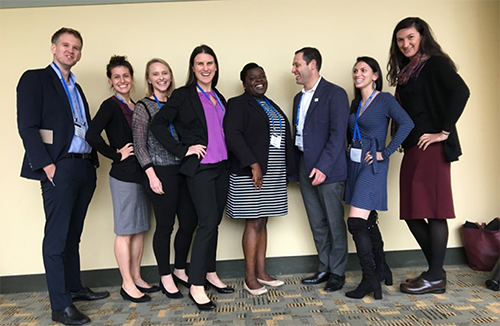Rebecca Brander: Perfecting the handoff to improve child health outcomes

Raising healthy children is like a track relay event. For children born in contexts where they are at a higher risk for disease, the handoff of the baton to them isn’t as smooth as it could be. It is difficult to recover from a poor handoff, and it has implications for the child’s entire life, which affects the whole population.
For Rebecca Brander, a third year doctoral student in the Department of Epidemiology, the inability to handoff the baton properly to the next generation is a social justice issue.
“It is an injustice that as a global society we aren’t meeting the health needs of everyone,” said Brander, who realized the role of public health in improving the health outcomes of children during trips to Haiti and Ecuador as a nurse assistant in her undergraduate program.
“I started wondering about the prevention aspects, like ‘How can diarrhea in young children be prevented?’ or ‘Why are diarrheal diseases more common here and less prevalent in other countries?’” said Brander. “I realized that if you want to intervene at a population level, there’s a lot of leverage in improving child health. If you take care of children, you can affect the whole population.”
This kind of thinking has steered Brander toward a career in public health and has guided her research through her Master’s in Public Health and now, her doctoral program. Most recently, it helped her receive the prestigious F31 research fellowship award from the National Institutes of Health (NIH) National Institute of Child Health and Development to support her dissertation research.
Diarrhea can have devastating consequences on young children. In fact, it is one of the leading killer of children under the age of five worldwide despite available and simple solutions for treatment. Children in low- and middle-income countries are disproportionately impacted by diarrheal diseases.

Through her Master’s thesis work and her participation with the Gut Health and Child Survival research group—which is housed under the Global Women, Adolescent, and Child Health (WaCH) program and led by Judd Walson, a professor in the Departments of Global Health and Epidemiology, and Patricia Pavlinac, an assistant professor in the Department of Global Health—Brander began to see the larger picture and health patterns of children affected by pathogens that cause diarrhea.
Children who had an episode of diarrhea went on to have more health issues down the road. They became malnourished. Their growth stunted. In some cases, it slowed cognitive development. Even after initial hospitalization, some children returned to the hospital not long after or worse, they died.
“Many deaths happen after hospitalization, but there isn’t much evidence for interventions addressing this time period after they go home,” said Brander.
This knowledge turned into the focus of her doctoral dissertation with the help of Walson and Pavlinac, who are also on Brander’s dissertation committee. Brander’s dissertation focuses on the time period shortly after hospitalization and treatment of a diarrheal disease or other infectious conditions. She is developing a model that predicts whether a child’s growth will deteriorate after their diarrhea episode, and evaluating whether these risks of growth faltering are associated with the kind of treatment they receive at the hospital for diarrhea. She is also working on modeling the health impacts and cost-effectiveness of different recommendations of care in this population, and an evaluation of hospital-based data collection methods.
As Brander was developing her dissertation aims, she was encouraged to apply for the F31 research fellowship grant from the NIH. The award supports pre-doctoral students as they conduct their dissertation research in scientific health-related fields relevant to the missions of a variety of NIH Institutes and Centers.
Brander received a two-year award for about $43,000 per year to cover her doctoral stipend, health care and tuition. F31 grants are notoriously difficult to get, with success rates well below 20 percent for most NIH Institutes/Centers.
Despite this difficulty, Brander said the application process made it worthwhile since it gave her experience in putting together an NIH grant proposal. The support she’ll receive from the grant will support her dissertation research and RA work, and its potential impact on child health.
“I hope it all moves closer to implementing child health interventions to further reduce child mortality in Sub-Saharan Africa,” Brander said. “Some of my projects will inform future research to that end – for example, one of my aims evaluates whether antibiotic treatment of diarrhea protects against growth faltering, which may inform clinical trials, and another of my aims evaluates data collection methods which will hopefully improve hospital-based data ascertainment in low-resource settings. I hope there will be policy implications as well – one of my aims is a comparative cost-effectiveness model that policymakers can use to manage resources to make the most impact on child deaths.”